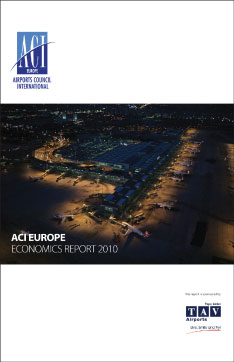 While 2009 may seem like a lifetime ago in light of all the turmoil and change which has elapsed in the meantime. Traffic uncertainty, excessive costs of capital and weakened profitability all remain worries which are keeping airport CEOs awake at night, with clear blue skies still remaining some way off. With the threat of a double-dip recession casting a cloud over the global economic outlook, the ACI EUROPE Economics Report 2010’s findings are all the more relevant.
While 2009 may seem like a lifetime ago in light of all the turmoil and change which has elapsed in the meantime. Traffic uncertainty, excessive costs of capital and weakened profitability all remain worries which are keeping airport CEOs awake at night, with clear blue skies still remaining some way off. With the threat of a double-dip recession casting a cloud over the global economic outlook, the ACI EUROPE Economics Report 2010’s findings are all the more relevant.
In this liberalised European aviation market, airports are facing extreme financial and competitive pressures. While low levels of airport charges and other support measures are often a prerequisite to attract a carrier to an airport, airports still need to cover the operational and capital costs required to facilitate their airline and passenger customers. Hence the ACI EUROPE Economics Report 2010 shows that the viability of Europe’s airports can no longer be automatically taken for granted, particularly in the face of trading conditions experienced in the last few years.
For example, and perhaps most telling of all, 41% of airports were loss-making in 2009. Yet at the same time almost 70% of airports either lowered their charges or kept them stable – a clear reaction to the harsh market conditions being experienced by the sector. And simultaneously there was a shift, not only in the level of charges but also in the structure of those charges. Moving to a higher proportion of passenger-related charges, airports stepped in and effectively shouldered more of the risk for which airlines were previously responsible, in addition to the lowering and freezing of charges. This meant that in 2009, airline-related charges accounted for only 19% of total airport revenues.
These steps taken, while a necessary response to satisfy market demand, have had a direct knock-on impact on airports’ plans for the future. Airports, under pressure, have been forced to decrease their capital expenditure projections for both 2010 and 2011. This can be traced back to the toxic confluence of cost of capital problems impacting the wider economy, with the airport industry-specific pressures outlined above.
“The findings speak for themselves,” notes Jeff Salter, Business Development Director of Copenhagen Airport and Chair of the ACI EUROPE Economics Committee. “While we must embrace both the challenges and opportunities that liberalisation has brought, the industry still needs to be given room to invest for the future. With air traffic set to double by 2030, the airport infrastructure must be in place to facilitate that growth.”
Caught between a rock and a hard place, airports remained heavily dependent on non-aeronautical revenues to subsidise core operations for airline customers, whilst also keeping their heads above water – so much so that these accounted for 47% of total revenues in 2009.
But while these efforts may help mitigate the problem, in the long run a more sustainable solution is required, with the facts making it clear that airports’ financial viability and the delivery of more capacity are intrinsically tied up with each other.
The report sheds light on other important policy issues too. With the Ground Handling Directive currently being revisited by European policy makers, it’s instructive to know that airport revenues from ground handling plunged 20% between 2009 and the preceding year. Overall, airports now represent only around 15% of this particularly competitive market. This not only highlights the far-reaching impact of the current Directive. It also suggests that existing competitive pressures are such that a further opening of the market risks its fragmentation, and in the process jeopardises the efficiency and quality of ground handling operations at many airports.
To download the full report, visit the Policy Library section of the ACI EUROPE website: www.aci-europe.org.







